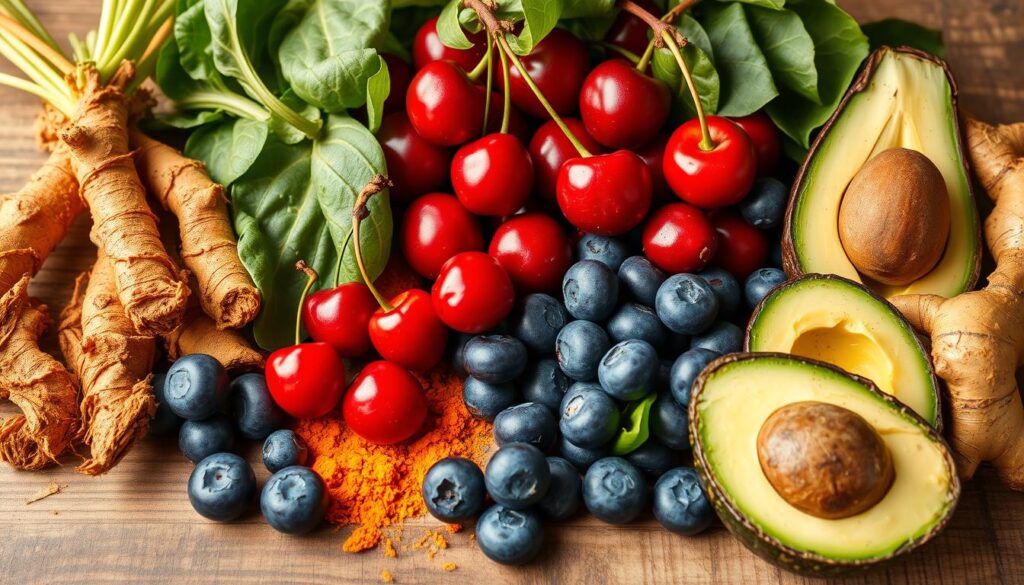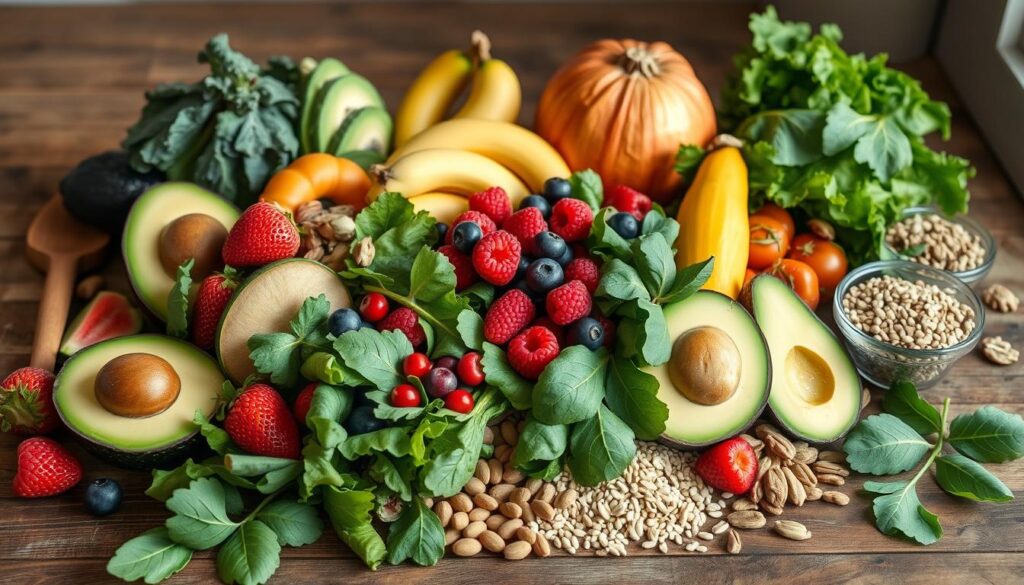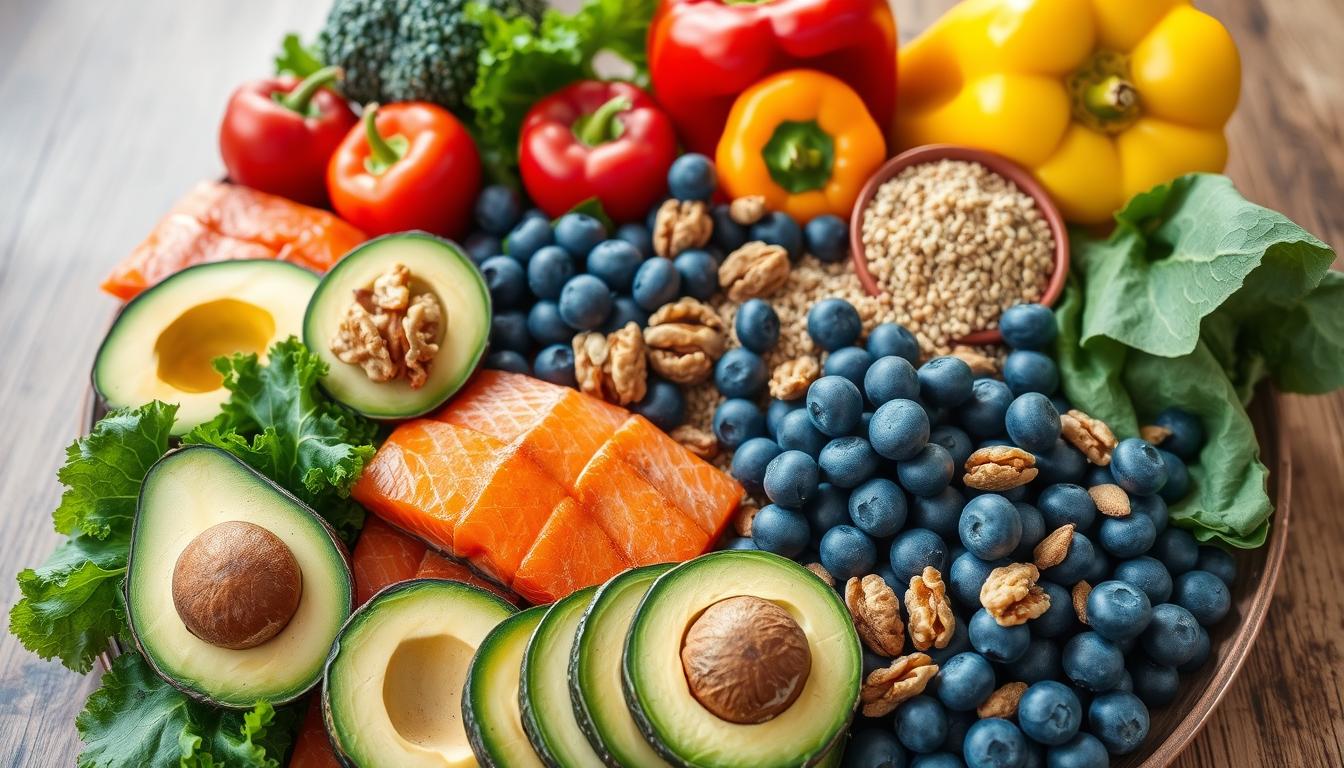Maintaining a healthy heart is crucial for our overall well-being, and the foods we consume play a vital role in this endeavor. This comprehensive guide explores the top seven foods scientifically proven to support cardiovascular health. We’ll delve into the nutritional benefits of each food, explain how they contribute to heart health, and provide practical tips for incorporating them into your daily diet. By understanding the power of a heart-healthy diet, you’ll be empowered to make informed choices that nourish your body and protect your most essential organ – your heart.
Key Takeaways
- Discover the top 7 foods that are scientifically proven to support heart health
- Learn how these nutrient-dense foods can contribute to cardiovascular well-being
- Gain practical tips for easily incorporating these heart-healthy foods into your daily diet
- Understand the importance of a balanced, heart-healthy diet for overall wellness
- Empower yourself to make informed choices that nourish your heart and body
By focusing on these top heart-healthy foods, you can take proactive steps to support your cardiovascular health and reduce your risk of heart-related issues. Explore the detailed overview of each food and how it can benefit your heart, as well as recommendations for incorporating them into your heart-healthy diet.
Understanding Heart Health and Nutrition Basics
Maintaining a healthy heart is a critical aspect of overall well-being, and diet plays a crucial role in this pursuit. When it comes to cardiovascular nutrition, there are specific nutrients and compounds that can significantly impact heart health.
How Diet Impacts Cardiovascular Health
The foods we consume have a direct influence on our cardiovascular health. Anti-inflammatory foods that are rich in antioxidants can help reduce the risk of heart disease, while cholesterol-lowering foods can support healthy blood lipid levels. Incorporating these beneficial nutrients into our daily diet is key to promoting a strong and resilient heart.
Key Nutrients for a Healthy Heart
- Omega-3 fatty acids: Found in fatty fish, these essential nutrients help lower triglycerides and blood pressure, reducing the risk of heart attacks and strokes.
- Fiber: Soluble fiber, such as that found in oats, beans, and berries, can help lower cholesterol and improve heart health.
- Potassium: This mineral plays a vital role in maintaining healthy blood pressure and supporting cardiovascular function.
The Role of Antioxidants and Anti-inflammatory Compounds
Antioxidants and anti-inflammatory compounds, often found in colorful fruits and vegetables, can help combat oxidative stress and inflammation – two key factors in the development of heart disease. By incorporating these powerful nutrients into our diet, we can support our cardiovascular system and reduce the risk of life-threatening conditions.

“Maintaining a balanced, nutrient-rich diet is one of the most effective ways to support heart health and reduce the risk of cardiovascular disease.”
By understanding the fundamental connection between diet and heart health, we can make informed choices to nourish our cardiovascular system and enjoy a lifetime of heart-healthy living.
Best Foods for Heart Health: A Comprehensive Overview
A heart-healthy diet is essential for maintaining cardiovascular wellness. Fortunately, there are numerous nutrient-dense foods that can support heart health and reduce the risk of heart disease. In this section, we’ll explore the top seven foods that are particularly beneficial for the heart.
First on the list are antioxidant-rich foods like berries, leafy greens, and dark chocolate. These foods are packed with compounds that can help fight inflammation, a key contributor to heart disease. Incorporating these best foods for heart health into your diet can provide a powerful boost to your cardiovascular well-being.
Another important category is heart-healthy fats, such as those found in fatty fish, nuts, and seeds. These healthy fats, particularly omega-3s, can help lower cholesterol levels, reduce blood pressure, and improve overall heart function.
| Heart-Healthy Food | Key Benefits |
|---|---|
| Berries | High in antioxidants, may reduce inflammation and improve heart health |
| Fatty Fish | Rich in omega-3 fatty acids, which can lower triglycerides and blood pressure |
| Leafy Greens | Packed with fiber, antioxidants, and nutrients that support heart function |
| Whole Grains | High in fiber, which can help reduce cholesterol and improve blood sugar control |
| Nuts and Seeds | Contain healthy fats, fiber, and antioxidants that may lower heart disease risk |
| Dark Chocolate | Rich in flavonoids, which can improve blood flow and lower blood pressure |
| Avocado | High in monounsaturated fats, which can help raise HDL (good) cholesterol |
By incorporating these heart-healthy foods into your heart-healthy diet, you can take a proactive step towards maintaining a strong and resilient cardiovascular system. Remember, a balanced and nutrient-rich diet is the foundation for overall heart health.

“A healthy diet is the best weapon we have against heart disease and stroke.”
– Dr. Mehmet Oz, Cardiothoracic Surgeon
The Power of Omega-3 Rich Fish
When it comes to a heart-healthy diet, few foods can match the cardiovascular benefits of omega-3 fatty acids-rich fish. These remarkable marine treasures are not only delicious but also play a vital role in supporting overall heart health.
Types of Fish Highest in Omega-3s
Some of the fish that boast the highest levels of omega-3 fatty acids include:
- Salmon
- Mackerel
- Sardines
- Herring
- Trout
- Anchovies
These fatty fish are rich in essential omega-3s like EPA (eicosapentaenoic acid) and DHA (docosahexaenoic acid), which have been shown to help lower blood pressure, reduce inflammation, and support healthy cholesterol levels – all critical factors in maintaining a strong and resilient cardiovascular system.
Recommended Serving Sizes and Frequency
To reap the heart-healthy benefits of omega-3-rich fish, experts recommend consuming them at least twice a week, with a serving size of 3.5 to 4 ounces per meal. This frequency and portion size can help ensure you’re getting an adequate supply of these essential nutrients to support your cardiovascular well-being.
Preparation Methods for Maximum Benefits
When it comes to enjoying omega-3-rich fish, the way you prepare them can make a big difference. To maximize the benefits, opt for healthy cooking methods like baking, grilling, or poaching, rather than frying, which can diminish the nutritional value. Seasoning your fish with heart-healthy herbs and spices can also enhance the flavor while providing additional antioxidant and anti-inflammatory properties.

By incorporating these omega-3-rich fish into your heart-healthy diet, you can take a significant step towards supporting your cardiovascular health and reducing your risk of heart-related issues. With the right preparation and consistent consumption, you can unlock the true power of these marine wonders.
Leafy Greens: Nature’s Heart Protectors
When it comes to supporting heart health, leafy greens are true superfoods. Packed with essential vitamins, minerals, and antioxidants, these nutrient-dense vegetables offer a wealth of benefits for cardiovascular wellbeing.
Leafy greens like spinach, kale, and collard greens are rich in dietary fiber, a key component for maintaining healthy cholesterol levels and blood pressure. Their high antioxidant content also helps neutralize harmful free radicals, reducing inflammation and oxidative stress on the heart.
Moreover, leafy greens are brimming with nitrates, which can help improve blood flow and lower blood pressure. Studies have shown that regularly incorporating these leafy greens into your diet can significantly reduce the risk of heart disease and stroke.
To reap the full heart-healthy benefits of leafy greens, aim to include them in your meals multiple times a week. Try tossing them into salads, blending them into smoothies, or sautéing them as a nutritious side dish. By making high-fiber foods and antioxidant-rich foods like leafy greens a staple in your routine, you’ll be taking a proactive step towards better cardiovascular health.

“Leafy greens are a true powerhouse when it comes to heart health. Their nutrient profile makes them an essential addition to any diet focused on preventing cardiovascular disease.”
| Leafy Green | Key Heart-Healthy Nutrients | Recommended Serving Size |
|---|---|---|
| Spinach | Magnesium, Folate, Vitamin K | 1 cup raw or 1/2 cup cooked |
| Kale | Vitamin A, Vitamin C, Calcium | 1 cup raw or 1/2 cup cooked |
| Collard Greens | Fiber, Vitamin E, Manganese | 1 cup raw or 1/2 cup cooked |
Berries and Their Cardiovascular Benefits
When it comes to heart-healthy foods, berries stand out as true superfoods. These vibrant, antioxidant-rich fruits not only delight the taste buds but also offer exceptional cardiovascular benefits. From blueberries to raspberries, each type of berry boasts unique properties that can support a healthy heart.
Antioxidant Properties in Different Berry Types
Berries are renowned for their high concentration of antioxidants, which play a crucial role in protecting the body from oxidative stress and inflammation. Blueberries, for instance, are packed with anthocyanins, powerful antioxidants that can help lower the risk of heart disease. Strawberries, on the other hand, contain ellagic acid, a compound with anti-inflammatory properties that can improve heart health. Raspberries, rich in quercetin, have been shown to possess anti-hypertensive effects, making them a valuable addition to a heart-healthy diet.
Daily Intake Recommendations
- Aim for at least one serving of berries (about 1/2 cup) per day to reap the cardiovascular benefits.
- Incorporate a variety of berries into your diet, such as blueberries, strawberries, and raspberries, to enjoy a diverse array of antioxidants and anti-inflammatory compounds.
- Consider adding berries to smoothies, yogurt, oatmeal, or enjoying them as a healthy snack to easily increase your daily intake.
By making berries a regular part of your diet, you can nourish your heart and support overall cardiovascular health. Embrace the natural sweetness and vibrant colors of these antioxidant-rich fruits for a delicious way to prioritize your heart’s well-being.
Whole Grains and Fiber for Heart Health
Maintaining a heart-healthy diet is crucial for reducing the risk of cardiovascular diseases. One of the key components of such a diet is the inclusion of whole grains and high-fiber foods. These nutrient-dense ingredients not only support overall health but also specifically contribute to the well-being of your heart.
Whole grains, such as oats, quinoa, and brown rice, are rich in soluble fiber, which has been shown to help lower cholesterol levels. By binding to cholesterol in the digestive system, soluble fiber can effectively reduce the amount of LDL (bad) cholesterol that is absorbed into the bloodstream. This, in turn, helps to improve heart health and lower the risk of heart disease.
In addition to whole grains, other high-fiber foods like legumes, berries, and vegetables also play a significant role in promoting cardiovascular well-being. These fiber-rich options can help regulate blood sugar levels, support healthy weight management, and reduce inflammation – all critical factors in maintaining a healthy heart.
To incorporate more heart-healthy whole grains and high-fiber foods into your daily routine, consider these practical tips:
- Start your day with a bowl of oatmeal, topped with fresh berries and a sprinkle of cinnamon.
- Swap out refined grains like white bread or pasta with whole wheat alternatives.
- Experiment with quinoa, brown rice, or bulgur in your favorite recipes.
- Add legumes, such as lentils or black beans, to soups, salads, and stews.
- Snack on a handful of nuts or seeds for a fiber-rich boost.
By making simple yet impactful dietary choices that prioritize whole grains and high-fiber foods, you can take a proactive step towards supporting your heart health and reducing your risk of cardiovascular disease.
Nuts and Seeds: Small but Mighty Heart Defenders
When it comes to supporting heart health, the powerful combination of nuts and seeds should not be overlooked. These unassuming, bite-sized wonders are packed with a wealth of nutrients that work to promote cardiovascular well-being. From their rich omega-3 fatty acid content to their cholesterol-lowering properties, nuts and seeds prove that good things can come in small packages.
Best Varieties for Heart Health
Among the top nut and seed choices for heart health are almonds, walnuts, flaxseeds, and chia seeds. Almonds are renowned for their high levels of monounsaturated fats, which can help lower LDL (bad) cholesterol and raise HDL (good) cholesterol. Walnuts, on the other hand, are an excellent source of omega-3 fatty acids, providing an anti-inflammatory boost to the cardiovascular system.
Flaxseeds and chia seeds are also noteworthy for their heart-healthy credentials. Both are rich in alpha-linolenic acid, a type of omega-3 fatty acid that has been shown to reduce the risk of heart disease. Additionally, the high fiber content in these tiny seeds helps to support overall heart health by promoting healthy cholesterol levels.
Portion Control Guidelines
While nuts and seeds are undoubtedly beneficial for the heart, it’s important to practice portion control to reap the maximum rewards. The recommended serving size for most nuts and seeds is about 1-2 ounces per day, or roughly a handful. Consuming larger portions can lead to an excess of calories and fat, potentially offsetting the heart-healthy benefits.
| Nut/Seed | Serving Size (1 oz) | Heart-Healthy Nutrients |
|---|---|---|
| Almonds | 23 nuts | Monounsaturated fats, vitamin E, magnesium |
| Walnuts | 14 halves | Omega-3 fatty acids, antioxidants |
| Flaxseeds | 2 tablespoons | Alpha-linolenic acid, fiber, lignans |
| Chia Seeds | 2 tablespoons | Omega-3 fatty acids, fiber, antioxidants |
By incorporating these nutrient-dense nuts and seeds into your diet in moderation, you can take a proactive step towards maintaining a healthy heart and supporting overall cardiovascular well-being.
Heart-Healthy Oils and Fats
When it comes to maintaining a heart-healthy diet, the type of fats and oils you consume plays a crucial role. While some fats can contribute to poor cardiovascular health, there are a variety of anti-inflammatory foods that can actually support your cardiovascular nutrition and overall heart function.
One of the best heart-healthy oils is olive oil. Rich in monounsaturated fats and antioxidants, olive oil has been shown to help lower bad (LDL) cholesterol levels and reduce inflammation throughout the body. Similarly, avocado oil is another excellent choice, as it is high in beneficial oleic acid and can support healthy blood pressure.
For those looking to boost their intake of omega-3 fatty acids, fatty fish like salmon, mackerel, and sardines are superb options. These heart-healthy seafood choices are not only rich in anti-inflammatory omega-3s but also provide a wealth of other essential nutrients.
When incorporating these heart-healthy oils and fats into your diet, moderation is key. Aim to replace unhealthy saturated and trans fats with these nutrient-dense alternatives, and be mindful of portion sizes to maintain a balanced and sustainable heart-healthy diet.
“Healthy fats are essential for maintaining a strong and resilient cardiovascular system.”
The Role of Dark Chocolate in Cardiovascular Health
Numerous studies have shown that dark chocolate, when consumed in moderation, can offer remarkable benefits for heart health. This antioxidant-rich food is a surprisingly powerful ally in supporting a healthy cardiovascular system.
Choosing the Right Type of Chocolate
To maximize the heart-healthy advantages of dark chocolate, it’s essential to select varieties that contain a high percentage of cacao, typically 70% or higher. These cacao-rich chocolates are richer in beneficial flavonoids and contain less added sugar, making them a more nutritious choice compared to milk chocolate or other sweet confections.
Benefits and Recommended Portions
Dark chocolate’s antioxidant properties can help reduce inflammation, lower blood pressure, and improve blood flow – all crucial factors in maintaining a healthy heart. Studies suggest that consuming a small, 1-ounce serving of dark chocolate a few times per week can be a delicious way to support a heart-healthy diet. However, moderation is key, as dark chocolate is still high in calories and should be enjoyed as part of an overall balanced lifestyle.





